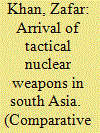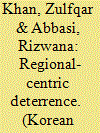| Srl | Item |
| 1 |
ID:
124766


|
|
|
|
|
| Publication |
2013.
|
| Summary/Abstract |
This article examines the arrival of Tactical Nuclear Weapons (TNWs) amid the rapid arms race in South Asia. It analyzes the stability and instability prospects linked to the arrival of and dependence on TNWs. It states that TNW is a murky term that confronts a definitional issue. Although TNW has not been used yet, it entails the risk of its use on the battlefield in the event of a limited war. Conceptually, this sets the stage for an interesting debate on whether or not the arrival of TNWs is stabilizing for the South Asian region, which has confronted many wars and minor border skirmishes during pre- and post-nuclear periods. Since it is viewed that a possible limited military escalation to a nuclear level may not be ruled out and the arrival of TNWs has become a reality, the article concludes that a centralized command and control system bolstered with the non-deployed deterring posture of TNWs is the immediate solution to avert the related worries of pre-delegation, force protection, and the use-or-lose dilemma. It is expected that, learning from their nuclear predecessors, the South Asian nuclear leadership would practice restraint, remain rational, and call for the need of political trust and military reassurances to avert nuclear weapon use.
|
|
|
|
|
|
|
|
|
|
|
|
|
|
|
|
| 2 |
ID:
124870


|
|
|
|
|
| Publication |
2013.
|
| Summary/Abstract |
Tactical nuclear weapons have become increasingly central to Pakistan's nuclear thinking in the past three years, significantly raising the risks of nuclear warfighting and accidents in periods of crisis, without producing military benefits.
|
|
|
|
|
|
|
|
|
|
|
|
|
|
|
|
| 3 |
ID:
125253


|
|
|
|
|
| Publication |
2013.
|
| Summary/Abstract |
It is generally believed that a stable nuclear deterrence averts wars between nuclear adversaries, and makes peace secure. This conceptual argument has merit in terms of the prevention of all-out war; but it does not fully address the need to prevent the outbreak of a limited war between two nuclear weapon states. India and Pakistan have already fought one limited war, Kargil, in a nuclear environment. These two relatively new nuclear weapon states rely on nuclear deterrence to address the external threats. While frequently occurring conflicts demonstrate this, a recurrence of limited war cannot be ruled out in this crisis-ridden region, which would be fraught with significant dangers of escalation. Using a qualitative research approach and deploying a structural deterrence theory as a conceptual guiding tool, this paper investigates the nuclear future of the region, including the prospects of war, conflict termination strategy, escalation control, escalation dominance mechanisms, and finally suggests some pertinent lessons for crisis stability.
|
|
|
|
|
|
|
|
|
|
|
|
|
|
|
|